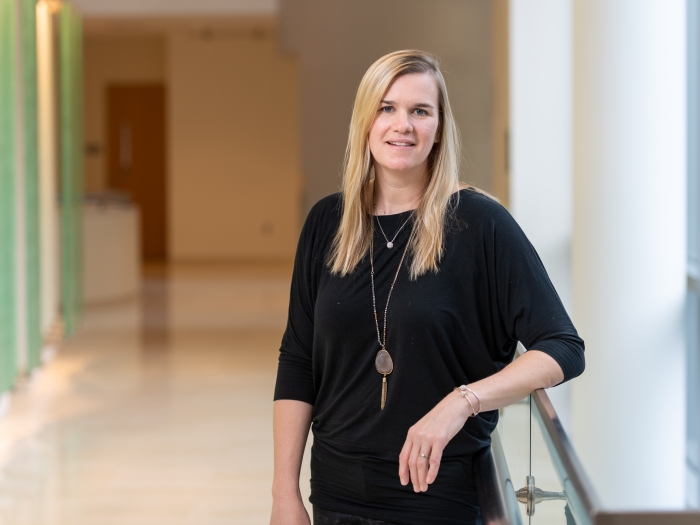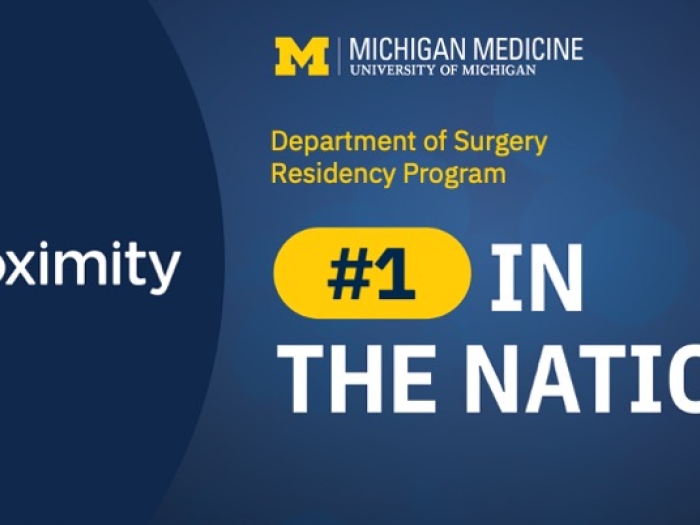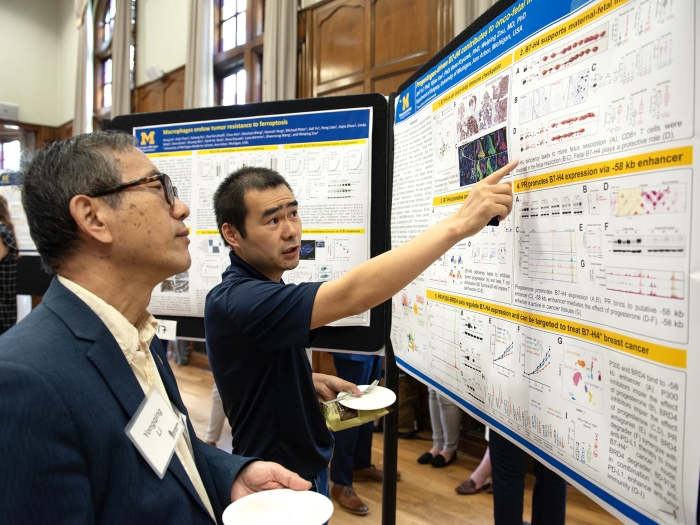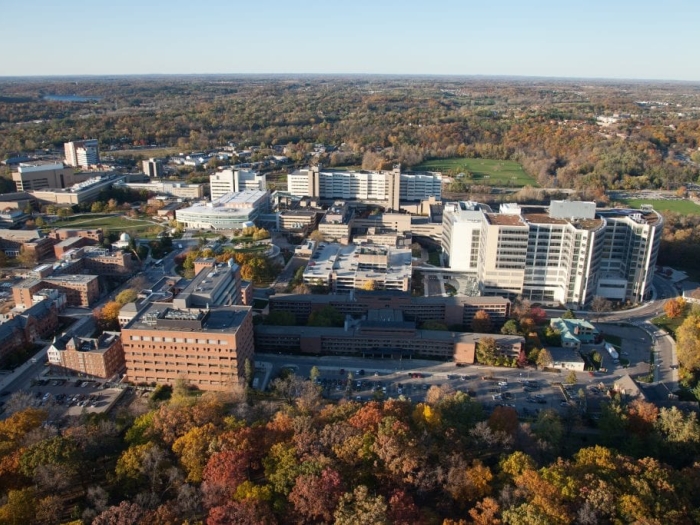
Outstanding Outcomes
We provide care for a wide range of vascular disorders, working alongside partners in multiple disciplines to deliver team-based, comprehensive treatment.
Michigan Vascular Surgery has skill and volume in both open and minimally invasive surgical cases, positioning us to tailor therapy to a patient’s specific needs — whether that’s open surgery for the most complicated aneurysm, or a minimally invasive EVAR or TEVAR, procedures we’ve been performing for more than 2 decades. Additionally, in our regular patient care conferences, we study complex cases and identify the best path forward for a patient’s care. This highly collaborative approach means our patients benefit from the insights of multiple experts.
Leaders in New Treatments
With our robust biomedical research enterprise, we’re able to translate discoveries in the laboratory to better treatments in the clinic. Past efforts include a clinical trial that established the safety and effectiveness of a minimally invasive approach to treating complex aortic aneurysm disease; participating in one of the few national trials for branched thoracic aortic stent grafts; and the development of American Heart Association guidelines for the management of peripheral arterial disease, now widely referenced as the national standard. Michigan vascular surgeons also performed the first Endurant IIs endograft for abdominal aortic aneurysm in the state and have been the leader in the development of new anticoagulants with lower bleeding potential.
Patients thrive when medicine is delivered with the best combination of skill, quality, compassion and technology. Our clinical outcomes demonstrate the strength of our decades of experience in the treatment of a broad range of vascular diseases, as well as our ability to apply the latest innovations.
We provide endovascular repair (EVAR), open repair, and fenestrated endovascular repair (fEVAR). We’re skilled at repairing AAA, including aneurysms that involve the kidney arteries. Through clinical trials, Michigan surgeons continue to provide safe minimally invasive strategies for treating more complex aortic aneurysm disease such as aortic necks with extreme angles, and aneurysms involving the iliac arteries.
As a Comprehensive Stroke Center, the University of Michigan is poised to deliver optimal and complete therapy for cerebrovascular disease. Together with our partners in Neurosurgery, Neurology and Interventional Neuroradiology, we offer a full range of treatments for cerebrovascular disease. We perform open carotid surgery and carotid stenting in the treatment of cerebrovascular disease, as well as surgical reconstruction techniques - now widely used - for cases of complex carotid disease and vertebra-basilar occlusive disease
U-M Health is a recognized leader in the evaluation and management of pediatric diseases of the aortic and renal arteries. Our broad multidisciplinary program draws on expertise in vascular surgery, interventional radiology, pediatric nephrology, intensive care, and anesthesia, as well as nurses and social workers, to form a comprehensive care team. We treat patients from as far away as the Middle East and from around North America.
We have several national leaders in PAD that set the standards for national clinical guidelines as well as perform cutting edge, internationally recognized patient-centered clinical outcomes and basic /translational research. We offer complete treatment options, including both open and endovascular therapy, for aortoiliac and femoropopliteal disease.
Our ability to utilize both advanced open and endovascular techniques translates into the best strategies for revascularization, as well as fewer procedural complications, and better medical therapies. We have access to all of the newest endovascular tools and are involved in many clinical trials, including the NIH-funded BEST trial. We also participate in the multi-disciplinary PAD Program at the Frankel Cardiovascular Center, where treatment is shared by multiple providers and services in a multi-disciplinary clinic.
We provide a standardized approach to evaluation of leg pain with exercise for pediatric patients. Our treatment algorithms for popliteal entrapment, cystic adventitial disease, endofibrosis and other rare causes of claudication are well-established and have been published in national journals.
Since the 1960s, Michigan has been a leader in the surgical treatment of renal and visceral artery occlusive and aneurysmal disease. Today, we’re a nationally recognized referral center for the care of renovascular hypertension and fibromuscular dysplasia, drawing patients from around the world. We also provide a comprehensive range of treatment options for splanchnic arterial aneurysms and chronic mesenteric ischemia, including minimally invasive (endovascular) options when appropriate.
Thoracic endovascular aortic repair (TEVAR) represents a life-saving, minimally invasive treatment option for patients who are not candidates for traditional open repair. We have more than 20 years of experience in performing TEVAR, a procedure that can also shorten hospital stays and recovery periods compared to traditional surgery.
U-M Health provides coordinated, multi-disciplinary care for the management of patients with all forms of thoracic outlet syndrome. We are the only site in the region to offer diagnosis and advanced treatment strategies at a high volume. We continue to innovate in the field through collaborative research within Michigan Medicine and with other centers of excellence across the country.
We have a long history of leadership in the treatment of superficial venous disease including varicose veins and superficial venous insufficiency. For varicose veins, we offer the full range of treatments from sclerotherapy, to less-invasive ablative procedures to powered phlebectomy, a technique which allows for the removal of a large amount of varicosities with fewer incisions. There are just a few locations in the country and in the world who offer this technique. For venous insufficiency, we offer minimally invasive treatment with radiofrequency ablation and laser ablation. All of these procedures can be performed as daytime surgery in the CVC, or conveniently at our outpatient surgery center in East Ann Arbor or our outpatient clinic in Northville. We offer a full range of available diagnostic and treatment options for venous reflux resulting in venous stasis ulcers.
We are amongst the leaders and experts in the diagnosis and treatment of thromboembolic disease, including DVT and PE; several of our surgeons have been central to the development of national and institutional guidelines for this treatment. We are also essential members of the Venous Health Program at the Frankel Cardiovascular Center, where the treatment of venous disease is shared by multiple providers and services in a multi-disciplinary clinic. This program offers not only the above treatments, but also the treatment of central venous obstructive problems, from both anatomic and thromboembolic causes.





